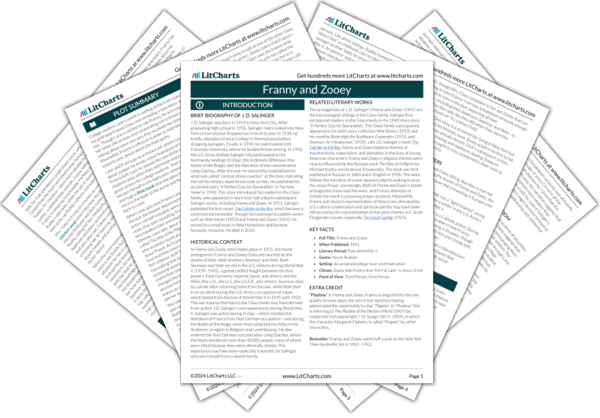While readers may be inclined to think of education as a positive force, Franny and Zooey suggests that education can harm students by encouraging them to chase knowledge and status rather than true wisdom. The novel illustrates the potential harms of education through Lane Coutell, the boyfriend of one of its protagonists, college student Franny Glass. Lane, a self-satisfied college student, knows a great deal about literature and about intellectual fashions such as psychoanalytic interpretation. He uses his knowledge to chase status, as, for example, when he contemplates getting his psychoanalytic reading of French novelist Gustave Flaubert published in a literary journal. Yet Lane possesses little wisdom or self-awareness: he is utterly confused and alienated when Franny tries to explain to him her dissatisfaction with the intellectual conformity and spiritual sterility of post-World War II U.S. campus culture. By contrast, Franny and her older brothers Buddy and Zooey are deeply skeptical of the mere accumulation of knowledge, preferring both Western and Eastern spiritual traditions that focus on “pure consciousness” and an inexpressible kind of wisdom. By contrasting the self-satisfied Lane with the curious, questing Franny and her brothers, Franny and Zooey suggests that education and knowledge-accumulation aren’t valuable unless they are accompanied by a genuine desire for knowledge.
Education vs. Wisdom ThemeTracker

Education vs. Wisdom Quotes in Franny and Zooey
“I think the emphasis I put on why he was so neurotically attracted to the mot juste wasn’t too bad. I mean in light of what we know today. Not just psychoanalysis and all that crap, but certainly to a certain extent.”
“If you’re a poet, you do something beautiful. I mean you’re supposed to leave something beautiful after you get off the page and everything. The ones you’re talking about don’t leave a single, solitary thing beautiful.”
“All that stuff . . . I don’t think you leave any margin for the most elementary psychology. I mean I think all those religious experiences have a very obvious psychological background—you know what I mean . . . It’s interesting, though.”
I can’t help thinking that you’d make a damn site better-adjusted actor if Seymour and I hadn’t thrown in the Upanishads and the Diamond Sutra and Eckhart and all our other old loves with the rest of your recommended home reading when you were small.
Seymour once said to me—in a crosstown bus, of all places—that all legitimate religious study must lead to unlearning the differences, the illusory differences, between boys and girls, animals and stones, day and night, heat and cold.
“You can’t live in the world with such strong likes and dislikes[.]”
“Those two bastards got us nice and early and made us into freaks with freakish standards, that’s all. We’re the Tattooed Lady, and we’re never going to have a minute’s peace, the rest of our lives, till everybody else is tattooed too.”











